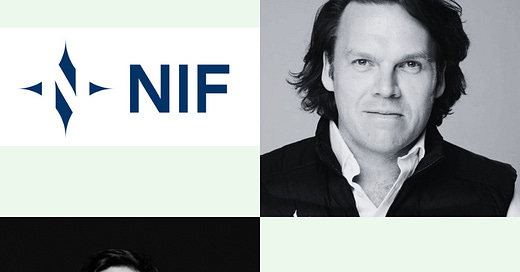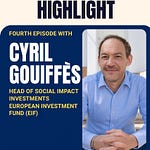Disclaimer from August Solliv: The views expressed are solely my own i.e. it’s my Sunday fun work 😉
Key insights:
Interview with Patrick Schneider-Sikorsky, Partner at NATO Innovation Fund (it took place live at GoWest in Sweden)
I know it’s risky and dodgy to talk about defensetech investments on an impact VC newsletter/podcast. These are normally seen as contradictory. I thought it was worth the risk to open up the discussion about what is defined by impact - is defense an impact topic if you operate in a war economy?
If you grew up in some parts of the Western World over the past 30 years, chances are you’ve never really had to think about defense. That reality is changing.
Defensetech is particular as most investments are deep-tech, capital-intensive, hardware-based, sold B2G, and require manufacturing to scale.
The three main barriers for defesentech to scale: 1. ESG exclusion criteria, 2. Hard to match the procurement criteria of states to win large contracts as start-ups, and 3. Limited demand signals.
Greetings to 3k+ Impact Supporters! 🌍 👋 We don’t typically associate defense with impact investing (and probably shouldn’t as it’s hard to invest in defense without also investing in offense).
However, I think it is worth having a debate about how the term “impact“ might change over time. Should defense be an impact topic if Europe were to end up being a war economy? It would come at the risk of polluting the term “impact“ of course.
Let’s dive into defensetech and resiliencetech with Nato Innovation Fund (≈7 min reading time):
Why defense is back 🔙
Particularities of deep-tech in defense 🔬
Barriers for defensetech today 🚧
Selling B2G in defense 🏛️
Overlap between climate and resilience / security ♻️
Next steps for NIF 🧭
Meet Patrick Schneider-Sikorsky 👋
Patrick is a partner at the NATO Innovation Fund (NIF). He started his career working in foreign affairs 🌍, then politics briefly, and for a longer time in corporate intelligence and security 🕵️. Patrick had a focus on companies in both the U.K. and Central and Eastern Europe and traveled around the region ✈️
Patrick then went to MIT for business school and when he was there he took a challenging course on how to commercialize IP from universities i.e. to build businesses from research 📘. Through that course, Patrick became interested in VC and especially in deep tech. He launched his own micro VC investing in deep tech companies, despite not having a science background himself 🧪. He ended up investing in over 20 companies in deep tech, both in the UK, Europe, and the US 🌐. That led him to join the NIF in 2023 ✨
Meet NATO Innovation Fund 💼
The NIF is the world's first multi-sovereign VC fund. It was created by 24 NATO allies, and they are deploying €1+bn to invest in deep tech companies in the defense, security, and resilience space. NATO understood that maintaining a technological edge is critical to the security, resilience, and defense of its allies and sees the NIF as a way to maintain that edge - as well as ultimately secure the prosperity of Western nations and of the Alliance. NIF puts first checks in Seed to Series B deals with ticket sizes up to €15M.
Defense Tech: Dual-use technologies that improve military capabilities (dual-use is defined as solutions with civilian and military applications)
Security Tech: Solutions that reduce vulnerability to external threats (e.g. critical infrastructure protection, cybersecurity)
Resilience Tech: Technologies that help nations withstand shocks (e.g. supply chains, energy independence, pandemic response)
So far, the NIF has announced 8 direct investments in companies across novel materials, manufacturing, space, quantum, robotics, and automation 🤖, as well as 6 fund investments
The NIF has the particularity of being a 15-year fund - to have a long time period for the portfolio companies to grow, scale, and innovate ⏳ Patrick sees that as critical for the success of companies in the deep tech and dual-use space 🚀
Why defense is back 🔙
We started with the basics: why is defense (and by extension, defense innovation) becoming more relevant for VCs?
Patrick was direct:
“We’re not moving into a war economy. But the idea that peace is the default - that was anomalous. We’re simply returning to the old normal, where defense and security are front and center.”
If you grew up in some parts of the West over the past 30 years, chances are you’ve never really had to think about defense 🧠. But with war back on the European continent and geopolitical tensions rising, that’s changing 🌍. Voters are demanding protection. Politicians are increasing budgets 💰. And new technologies built by startups - from drones to satellites to quantum encryption - are becoming essential tools for resilience 🛰️
“Startups are building agile, cheaper solutions that adapt faster. They bring a different DNA - more iterative, more efficient, and increasingly relevant.”
→ And many resilience and security topics are also impact topics - NIF has, for example, co-invested with Future Planet Capital and World Fund. See stats below about the size of resilience, security, and defence in Europe:
Source: Nato Innovation Fund, 2025
Particularities of deep-tech in defense 🔬
Deep tech solutions take much longer to scale and grow 🐢 Deep tech investments often happen in unproven technologies that still need some research proof points and commercial proof points 📊 Moreover, many solutions are complex as they are very capital-intensive, involve hardware, and require manufacturing to scale 🏭
NIF only invests in solutions that have a willingness to work with government, ministries of defense, national security agencies, etc. Patrick describes it as a potential booster of commercial returns, as the solutions they invest in will get business from governments that are currently increasing their military spending.
Barriers for defensetech today 🚧
Patrick says:
“€1 billion is a start. But we’ll need much more. Government spending is going up, especially in Eastern Europe. But the private sector has to step in too. That means crowding in VC and private capital.”
There are a few barriers in the way:
ESG exclusions: Many funds automatically disqualify anything defense-related.
Procurement friction: Startups struggle to navigate MoD (Ministry of Defense) procurement systems.
Lack of demand signals: Without clear commitment from governments, founders avoid the space.
“To change this, we need to clarify how to invest in defense responsibly. And we need governments to clearly signal what they’re looking for.”
Patrick sees dual-use as a strategic bridge 🌉 Startups can build commercial-first products that serve both civilian and defense use cases. And government validation can become a powerful technical endorsement ✅
Selling B2G in defense 🏛️
Patrick says that a lot of MODs have quite arcane procurement processes, making it hard for small start-ups to compete with larger companies on large state contracts 🏗️ VCs and private capital are part of bridging the valley of death between the small-scale “pilot projects“ that win small grants and building the solutions that win large state contracts 💼
Moreover, most NATO MoDs work with solution providers from NATO primarily (with some exceptions - for example, Patrick says that a European country could probably buy a solution from Japan) 🌐, which creates a limited market for producers but also high barriers to entry for solutions 🚪
Overlap between climate and resilience / security ♻️
NIF also invests in resilience and security. They, in general, identify artificial intelligence (AI), biotechnology, energy & propulsion, materials science, and space as high-impact verticals.
Patrick gives the example of small modular reactors and fusion technologies - these technologies will massively reduce our carbon footprint, but will also make us far more energy resilient by producing more energy locally 🔋 Patrick says that the overlap between climate and resilience is growing, and he also sees climatetech funds realising that overlap 🌍
Next steps for NIF 🧭
Over the next 24 months, NIF will focus on:
Investing in underfunded regions like Central & Eastern Europe, Southern Europe, and the Nordics
Backing more startups in space, autonomy, quantum, and critical infrastructure protection
Supporting portfolio companies in navigating procurement across NATO countries
Advocating for more Allies to join the fund
Patrick also called out subsea autonomy and counter-drone tech as high-priority investment areas.
Thanks for reading this week’s newsletter! Let me know what you think of this article and who else I should interview in this series - either in the comments section or in my DMs. Please subscribe to stay updated on articles about everything related to impact VC - and share with friends and colleagues. See you next week for another issue! 👋
Links to articles/data mentioned:














Share this post